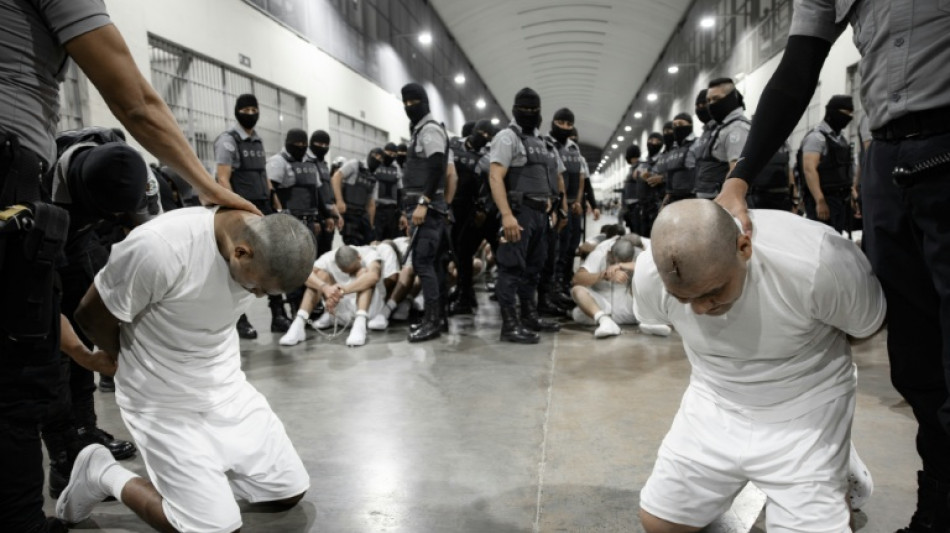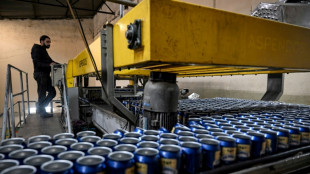

Lawyers for jailed Venezuelan migrants accuse El Salvador of 'torture'
Lawyers for 252 Venezuelans deported by US President Donald Trump's administration and imprisoned in El Salvador for two months alleged Friday that the migrants are victims of physical and emotional "torture."
A law firm hired by the Venezuelan government said that it had been unable to visit the migrants in the mega-prison where they are locked up.
The lawyers are seeking "proof of life," but say they have come up against a wall of silence from President Nayib Bukele's administration and the Central American nation's justice system.
Grupo Ortega filed a habeas corpus petition with the Supreme Court on March 24 seeking an end to what it calls the "illegal detention" of the Venezuelans, but is still waiting for a ruling.
"They are treating them like common criminals," lawyer Salvador Rios said, after the migrants were shown dressed in prison clothing, shackled and with shaved heads.
"This is torture," both physical and psychological, Rios said in an interview with AFP.
The lawyers delivered a letter in early May to Bukele, a key ally of Trump, requesting authorization to visit the Venezuelans, but so far without success.
AFP sought a comment from the Salvadoran presidency about the case and the lawyers' efforts, but has not received a response.
Salvadoran Vice President Felix Ulloa told French media outlet Le Grand Continent that his government merely provides a "service that we could call prison accommodation."
- Psychological damage -
Trump's administration has paid Bukele's government millions of dollars to lock up migrants it says are criminals and gang members.
Trump invoked rarely used wartime legislation in March to fly migrants to El Salvador without any court hearing, alleging they belonged to the Tren de Aragua gang, a charge that their families and lawyers deny.
The Venezuelans, as well as 36 deported Salvadoran migrants, are being held in a maximum security prison built by Bukele to house thousands of suspects arrested during his sweeping crackdown on street gangs.
Images of the Venezuelans entering the CECOT mega-prison in shackles illustrate the brutality, Rios said.
"The damage is not only physical, but also psychological," Rios said.
In their letter to Bukele, the lawyers sought permission to interview the prisoners, either in person or virtually, which could serve as "proof of life."
They asked Bukele to release the list of the 252 Venezuelans, something that Washington has not done either.
One of the Salvadoran migrants imprisoned in CECOT is Kilmar Abrego Garcia, a US resident deported due to what the United States itself admitted was an administrative error.
A Venezuelan identified in US court documents as "Cristian" was also mistakenly expelled.
In both cases, US judges unsuccessfully asked the Trump administration to facilitate their return to the United States.
- 'Complete powerlessness' -
UN human rights chief Volker Turk said this week that the situation "raises serious concerns regarding a wide array of rights that are fundamental to both US and international law."
"Families we have spoken to have expressed a sense of complete powerlessness in the face of what has happened and their pain at seeing their relatives labelled and handled as violent criminals, even terrorists, without any court judgment as to validity of what is claimed against them," he said in a statement.
Isael Guerrero, another lawyer with Grupo Ortega, described the detentions as "completely illegal" because the Venezuelans "are not being legally prosecuted in any court" in El Salvador.
The firm's head, Jaime Ortega, said they are "100 percent migrants."
"Not a single one of them is being prosecuted" in the United States for their alleged membership of the Tren de Aragua gang, he said.
The fate of the Venezuelans now depends entirely on Bukele, as "the expulsion completely nullifies US jurisdiction," Ortega said.
In April, Bukele offered to trade the 252 Venezuelans for an equal number of political prisoners held by President Nicolas Maduro's government.
L.Lewis--PI



